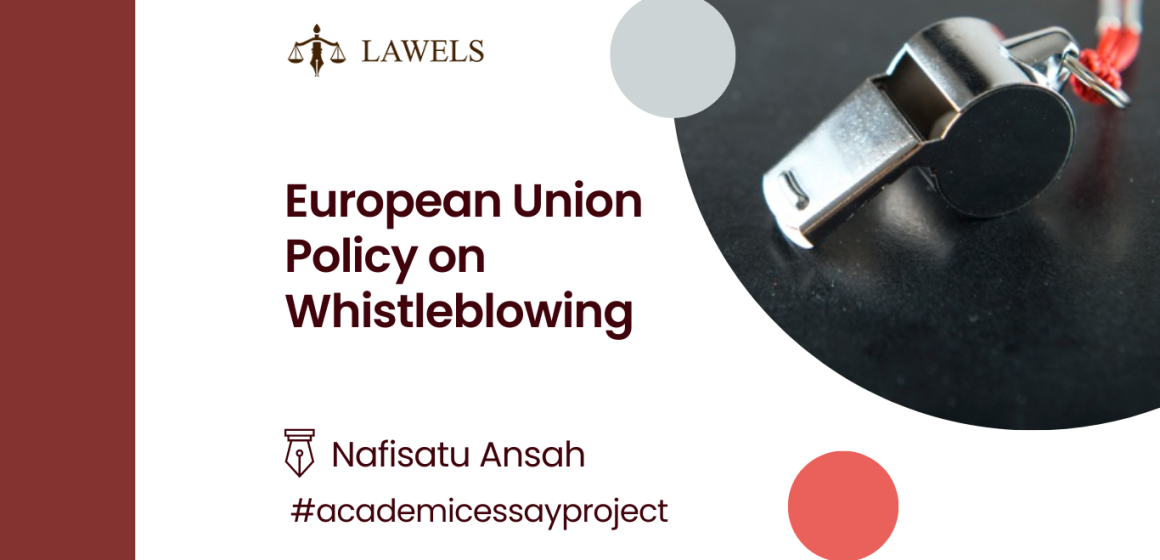Author: Nafisatu Wiafe Ansah, LLB University of Padova, 2015-2016
Legal Editor: Bader Kabbani, LLM International Commercial and Economic Law, SOAS, University of London, 2020-2021
Misconduct and illicit activities can cause significant damage to victims, including public, governmental, and private entities. One effective way to discourage wrongdoing within organizations is through the implementation of effective whistleblowing policies. In this article, we will analyze the EU’s whistleblowing policy to better understand this phenomenon.
What is Whistleblowing?
Criminal or illicit activities can occur in both the corporate and governmental space, making it crucial that these acts are not only reported but also sanctioned. Such sanctions must serve as a deterrent to others who may be inspired by these acts. One effective way to ensure that illicit activities are reported is by implementing comprehensive policies that make whistleblowing legal and an obligation for those who have information regarding such acts.
Whistleblowing is when a worker or anyone who is aware of any wrongdoing or misconduct in an organization, whether it be governmental or private, reveals or reports such acts. Despite being controversial and sometimes highly criticized, whistleblowing is considered to be an effective measure in identifying and preventing wrongdoings. It can be internal when the whistleblower reports wrongdoings perpetrated by people within the same organization. Or in other words external, if the whistleblower stands outside the organization.
The Benefits of Whistleblowing
This act, more often than not, presents itself as an act of public service because of the benefits that the organization affected and the public as a whole avail. In fact, some of the key benefits of whistleblowing, among others, are:
- The prevention of wrongdoings: the presence of a well-set, detailed and effective whistleblowing policy serves as a deterrent in preventing misconduct of both employees and employers;
- The reduction of losses (both financial and reputational): illegalities or wrongdoings committed in both private and governmental organizations, even though beneficial to the actors, tend to be expensive on the victims, thus reporting such activities enables the organization to put in place measures to tackle the issue at hand and prevent future ones;
- The creation of trust and better communication: the implementation of an effective whistleblower creates a better working environment, which is more efficient;
- Helps in fighting corruption.: whistleblowing is extremely important in eradicating, or at least minimizing, corruption both in the public and private sectors.
Disadvantages of Whistleblowing
Whistleblowing, however, has consequences that may adversely affect the whistleblower such as:
- The risk of job loss;
- Workplace repercussions, where there is no loss of job;
- Legal issues or the threat thereof.
Such negative consequences constitute obstacles that prevent well-meaning people who have valuable information about misconduct or wrongdoings to report them.
The EU Policy of Whistleblowing
Recognizing the importance of such selfless acts and the need not only to encourage them to aid in building a more transparent and open society, has mandated that Member states adopt specific internal legislation to promote it. In particular, the union has identified and acknowledged the important role whistleblowers play in the proper enforcement of EU legislation (they can report the non or improper implementation or violation of union legal instruments).
The EU also acknowledged the fragmented nature of whistleblower protection across the union. Indeed, prior to December 2019, only a few countries (ten countries, including France, Hungary, Ireland, Italy, Lithuania, Malta, Netherlands, Slovakia, Sweden and the United Kingdom) had comprehensive legislation protection to protect whistleblowers, whiles the remaining Member states had only partial protection systems in place (such as coverage only for specific sectors – financial – and individuals – public sector workers), which proved quite problematic considering the high level of interconnectedness for which the insufficient protection in one member state has repercussions in another. Another problem was given by the fact that, at the EU level, there was almost sole concentration of protection of whistleblowers in the area of financial service, thereby, leaving other vulnerable areas without coverage.
Directive 2019/1937
In 2019, the EU enacted an innovative 2019, directive 2019/1937, which entered into force on December 16, 2019 (even though some Member states still have not complied). In this directive, the Council and Parliament highlight the notion of public interest and how the implementation of policies that encourage whistleblowing, and provide better protection for whistleblowers, may serve to tackle breaches, misconduct or omissions that are harmful to the public interest.
The main aims of the Directive are to: Detect and prevent wrongdoings and violations of laws and regulations; protect whistleblowers by enabling them to report wrongdoing or irregularities in a safe way by also making it possible for them to report such acts anonymously; improve law enforcement by implementing effective, reliable, and secure reporting channels to protect whistleblowers from retaliation. But the most important aim pursued is to “enhance the enforcement of Union law and policies in specific areas by laying down common minimum standards providing for a high level of protection of persons reporting breaches of Union law”.
An innovation in the directive is the definition of who a whistleblower is (or reporting persons), meaning, “a natural person who reports or publicly discloses information on breaches acquired in the context of his or her work-related activities”.
The legislation is applicable to private entities employing more than 50 people and public entities (including municipalities and authorities) with over 10.000 inhabitants, and it requires them to adopt internal reporting channels that are suitable to their proportions and their needs. The approach adopted by the directive is to diversify the transposition period for member states (who were given a two-year period from when the directive entered into force) and for businesses depending on the size of the company (i.e., companies with 50 to 250 employees were given more grace period to implement the measures in the directive), thereby providing ample time for all to comply.
The legislation is intended to ensure that people who report issues, on the reasonable grounds of the veracity of the information at the time of the reporting and that the information falls under the scope of the directive, are protected. The protection offered to whistleblowers includes the prohibition of retaliatory action against such persons (such as transfer of duties, lay-off, suspension, dismissal, demotion, harassment, unfair treatment etc.).
There is also the provision of measures of support that Member States must make available, such as:
- Free, easily accessible comprehensive and independent information and advice, to the public on procedures and remedies available, on protection against retaliation, and on the rights of the person concerned;
- Legal aid in criminal and in cross-border civil proceedings.
- Effective assistance from competent authorities before any relevant authority involved in their protection against retaliation,
- Financial assistant.
The directive also requires Member States to establish both internal and external reporting channels, which may be relied upon when the internal ones prove inadequate. With all these measures put in place, the EU seems to be well-equipped to lead the effort in creating more transparency and combating the systematic opacity that breeds corruption and misconduct.
Conclusion
The major problem confronting the cohesion in the EU as whistleblowing is related is the reluctance of Member States to comply. Indeed, by the deadline in March of 2021, only 5 had adopted the mandated national legislation required by the directive. In the last couple of years, more States have proceeded with the enactment of the relative national legislation (with some countries, such as Austria, only implementing it in the first quarter of 2023). However, there are still countries that haven’t complied with the measure. This raises serious questions on the real commitment of Member States (and even large companies in the Union), not only towards the directive but mainly towards a more harmonized protection of whistleblowers across the Union.
Bibliography
- D Lewis, AJ Brown, R Moberly, Whistleblowing, its importance, and the state of the research, 2014.
- Culiberg and K.K. Mihelic, The Evolution of Whistleblowing Studies: A Critical Review and Research Agenda, 2016.
- Vinten, G., “Whistleblowing towards disaster prevention and management”, 2000.
- M Keil, A Tiwana, R Sainsbury, S Sneha – Toward a theory of whistleblowing intentions: A benefit‐to‐cost differential perspective, 2010.
- J Heese, G Pérez-Cavazos, The effect of retaliation costs on employee whistleblowing, 2021.
- P. Near, MP Miceli, Effective-whistle blowing, 1995.
- Lim CR, Zhang MWB, Hussain SF, et al. J Patient Saf. The consequences of whistle-blowing: an integrative review, 2021.
- European Commission, Whistleblower protection factsheet, 2018.
This article is written within the Academic Essay Project (AEP) organised by LAWELS. AEP aims to increase the number of quality academic writings on legal topics, encourage young lawyers to participate in academic writing, and lay the foundation of an online database on legal science. The team of legal editors and legal writers share their knowledge through high-end essays that we are publishing on our website and social media accounts for the world to read and learn from.
The articles on the LAWELS platform are not, nor are they intended to be legal advice. You should consult a lawyer for individual advice or assessment regarding your own situation. The article only reflects the views of the author.


